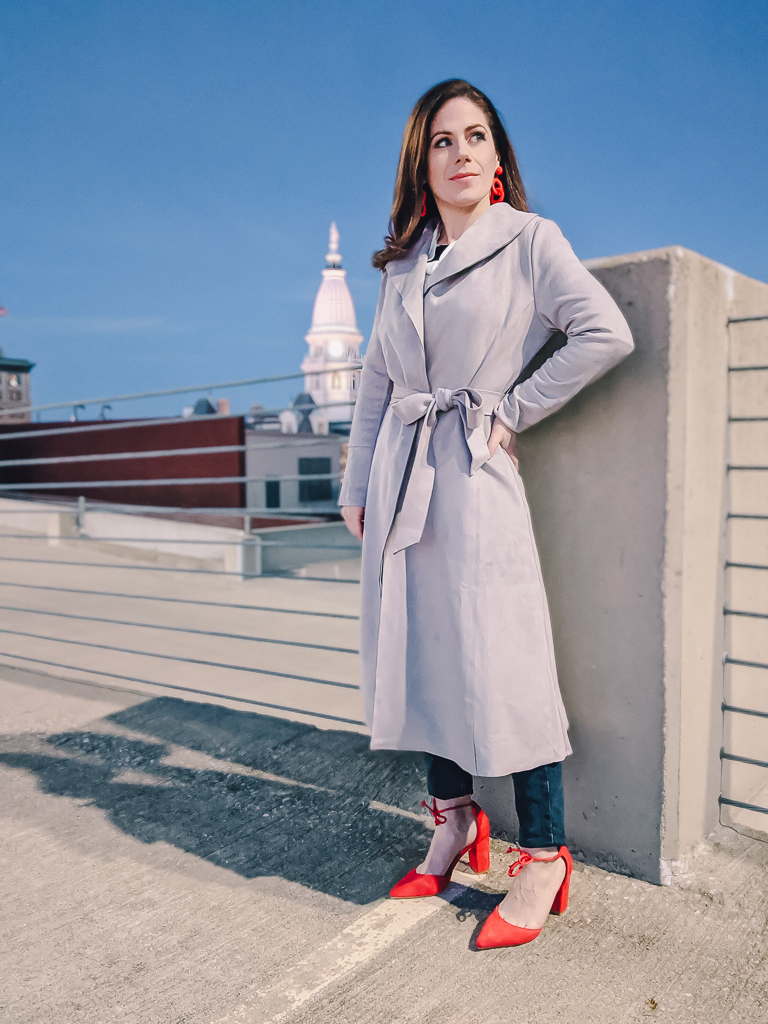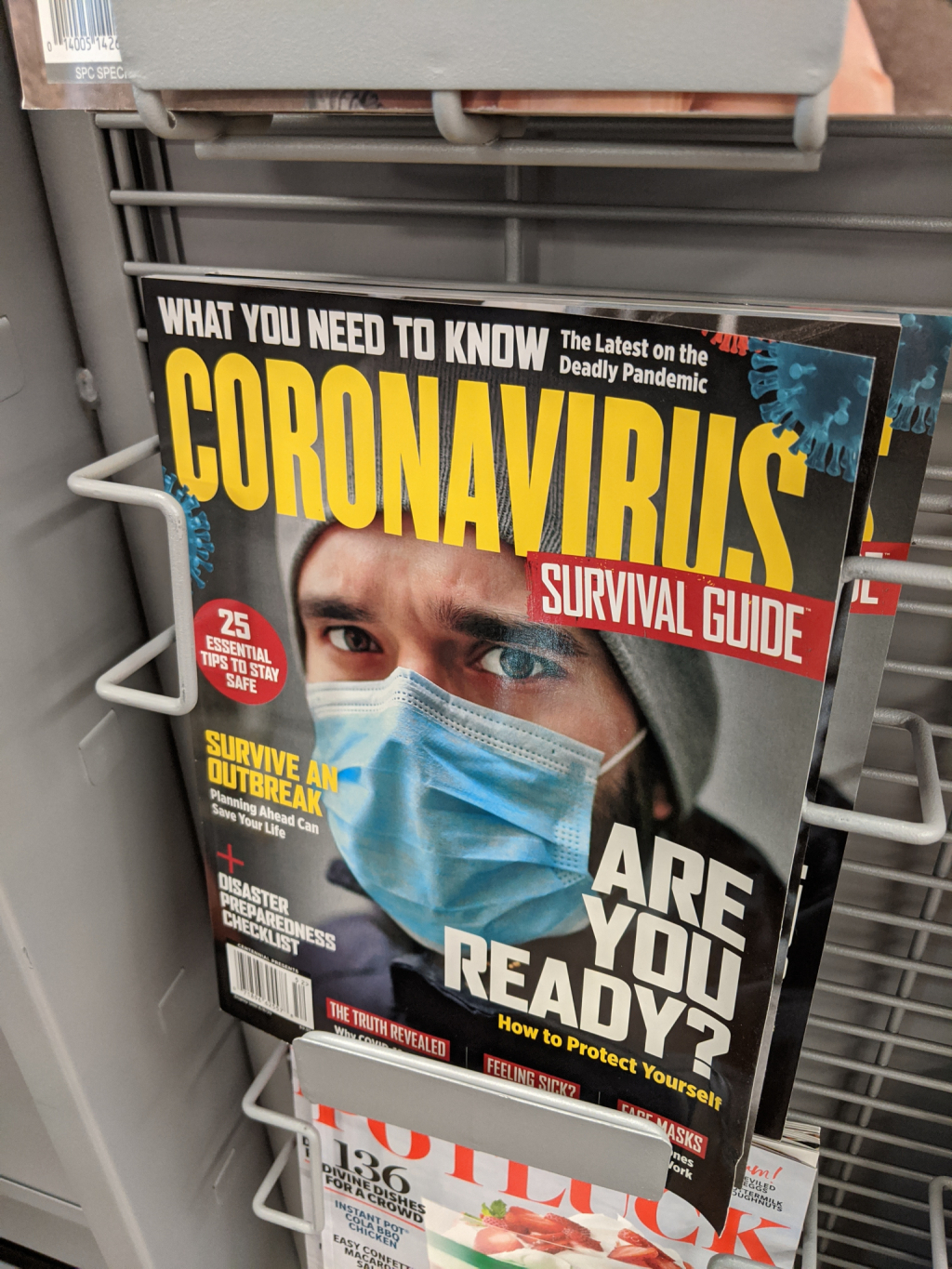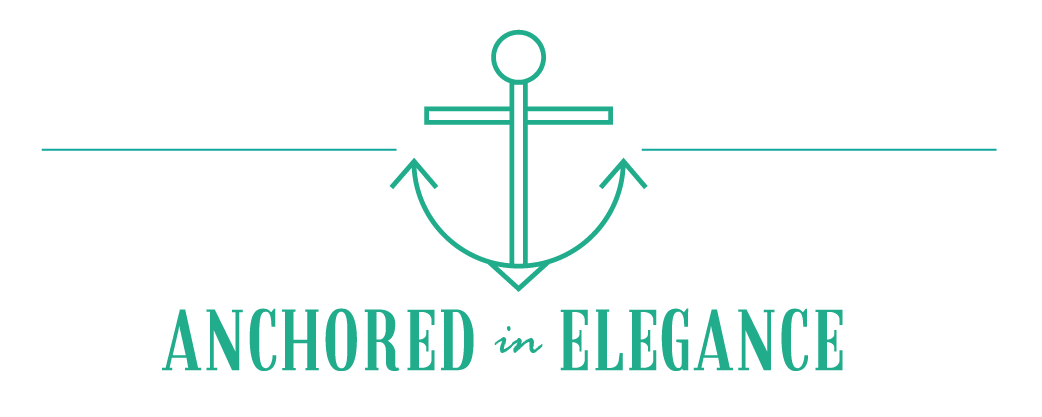Coronavirus Coverage: A Journalist’s Guide to Separating Hype From Fact

Feel like you’re constantly looking over your shoulder? As the novel coronovirus races across the globe, travel bans begin, schools and sporting events shutter, the stock market plunges, and Italy quarantines its entire population, it’s natural to feel distress. The unknown is scary! The World Health Organization has labeled COVID-19 a pandemic, urging countries to take urgent and aggressive action. However, this post is not really about the virus. Rather, it’s designed to help you digest coronavirus coverage with a discerning, less panicked eye.
We shouldn’t be brawling over toilet paper people! Does Midwestern nice go out the window in a pandemic? Then again, when you spot fearmongering headlines (like the magazine below) in your grocery aisle, perhaps it’s not surprising.

My goal is to help you feel empowered as you gather information. You can be your own reporter. There is a plethora of primary source information you can draw from online, including daily situation reports from the World Health Organization. I’m also writing this is because I am hearing an awful lot of “it’s media hype” and “this is no different than the flu” type comments. We can all draw our own conclusions based on the evidence available, but I strongly encourage you to read the firsthand accounts, like this one, coming from Italian doctors.
Their narratives, describing “war-like” conditions, break my heart. Italian hospitals and medical staff are so taxed right now, many are forced to leave patients to die—lucid and alone—after a final video call to loved ones. “It’s as if they are drowning, but with plenty of time to understand it,” one provider said. Those words had me rethinking my own attitude about the inconvenience of COVID-19, particularly this line…
So be patient. You can’t go to the theater, museums, or the gym. Try to have mercy on that myriad of older people you could exterminate. ~ Dr. Daniele Macchini

Yes, there are many differences between Italy and the United States. Italy has one of the world’s oldest populations, it was already struggling with vast public debt, and it’s free universal health care is woefully under-funded. My husband and I saw that clearly when we lived in Siena, Italy last summer teaching study abroad. But these differences won’t provide the U.S. immunity from impact. Personally, I’m grateful Italy is sounding the alarm. But let’s get to the real purpose of this post…
Coronavirus Coverage
4 Things to Consider While Reading the Headlines
When you are dealing with breaking/developing news stories, information is rarely as black and white as we might wish. In fact, after 10+ years in broadcasting, I can personally attest to its fluidity. In these scenarios, information fluctuates, changes, and sometimes has an agenda. So… Here are four things to consider while reading headlines—from someone who used to write them.
 During crisis, information is rarely as black and white as white as we might like…
During crisis, information is rarely as black and white as white as we might like…
1. Media reports are designed to convey a sense of urgency
You might feel coronavirus coverage is over-hyped or sensationalized right now. I get it… However, when is the last time you recall universities closing classrooms for half a semester? Have you ever seen so many sporting events (e.g. March Madness) called off? Can you recall another period when this many employers cancelled conferences, gatherings, and required staff to telecommute? It hasn’t happened in my lifetime… These decisions carry massive financial implications. They are not something we see in response to seasonal flu, despite its significant death toll. That brings me to point coronavirus coverage point #1.
There is an important distinction between “urgency” and sensationalism. A good journalist writes snappy headlines that encourage the reader to continue reading. It’s our job to pique your curiosity/nudge you just enough that you will take time out of your busy day to dive into the full article. Once we’ve pulled you in, reputable reporters then deliver on their introductory headline promise, fleshing out vital details and explanation. They should convey all the important facts they have available at their disposal, allowing you to make an informed decision about an emerging issue/threat.
Headlines might feel “splashy” at times, but we need to remember they are a necessity. In the era of click bait, journalists have to find a way to cut through the digital noise. How else can they to pause the “scrolling” to deliver news people need to hear? That said, there is absolutely no excuse for headlines that distort/exaggerate facts. Coronavirus coverage, like the magazine above, is a prime example. Opportunistic garbage!

2. Read beyond the headline
Now that we’re looking at a headline as a device/tool for pulling in an audience, it’s time for some frank talk. If there ever were a time when you don’t want to rely solely on headlines for information — this is it! By nature, crisis communication is layered and nuanced. There is so much context you miss when you fail to read a full article. Worse yet, people don’t hesitate to share/react to an article on social media based on headline information alone. During a high stakes public health situation, that’s frightening. This is where conspiracy stories, cries of “fake news”, and misinformation spread like wildfire.
In fact, simply missing a key word or two, can escalate panic. Take the CDC’s recommendation encouraging individuals at higher risk to “stock up on supplies” so they are prepared to stay at home for an extended period of time. Miss the “higher risk” distinction and you might take it as a green light to prep for Armageddon!
No, the CDC is not saying we need to clear store shelves of toilet paper, nor is the media. Merely, it is suggesting that **if you have significant underlying health conditions** and are older, preparations make sense.

3. Who is the source?
Every time I read a news article, I consider source credibility. I expect that source’s credentials to be adequately explained and I want to see multiple sources. One-source stories leave the door wide open for sensationalism. There will always be a hack out there who is willing to say something outrageous. Reputable news organizations do not publish those claims. If they do (some outlets might consider a far-out claim from a public figure newsworthy, due to that person’s prominence), they should always balance that information with additional sources.
Plenty of news stories—and coronovirus coverage in particular—will include links to original source material. Press releases, government websites/statements, or statistical documents/maps are hugely helpful in separating hype from fact. Don’t hesitate to read these pieces of information yourself! The links allow you to be the reporter.

4. Diversify your news diet
During breaking news, information changes rapidly. Reporters are constantly updating their copy. Furthermore, outlets will approach coronavirus coverage from different angles. When you diversify your news diet, consuming coverage from a wide range of publications, you are boosting your immunity to hype. “Fake news” becomes pretty glaring when you read reports from multiple international, national, and LOCAL outlets.You don’t want to be limited to a single channel.
Why the emphasis on local? This is a time when you truly need your local media. Local news often gets a bad wrap. However, if coronavirus comes to your community, local media will have the most immediate developments tailored to your specific area. They will focus on your city, your schools, and your businesses. They will have the most updated numbers from area hospitals and health departments.
If you feel on edge, remember information is power! Gather it in bulk an you will be well equipped to suss out any sensationalism.
More “News Life” Content:
Best and Worst Career Advice I’ve Ever Received
News Anchor Outfits: The BEST of Amazon Dresses
Related
Related Posts
Journalism to Blogging: Making the Switch?
They are among the most common questions I get… How did you go from journalism…
Related
Life lessons from a journalist: 5 tips for ALL careers
Anyone else find themselves feeling reflective as we approach the end of 2018? I’…



Katey | 13th Mar 20
Loved this article, Linds!! It came at a perfect time as I am beginning to panic! Hope you all are staying healthy and well. Miss you. And thank you again for the article!
laveremis | 14th Mar 20
It’s hard not to feel some sense of panic right now! Miss you too. We are all doing well. Hopefully we can get together this summer – with Australia cancelled we have all the time in the world!